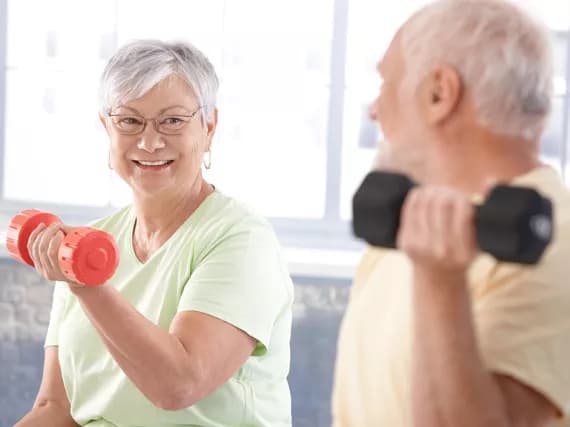
Aging Tests Yield Varying Results
Whether it's an on-line quiz, a $300 chromosome test or an $800 blood panel, a lot of people seem to be interested in whether they're aging faster or slower than their chronological age would suggest.
Unfortunately, they're just going to have to wait and see.
A head-to-head comparison of 11 different measures of aging, including blood and chromosome tests like those being sold commercially, has found that they don't agree with one another on how fast a given person is growing older.
This comparison is based on a life-long study of nearly 1,000 people in Dunedin, New Zealand who have been studied extensively from birth to age 38.
Researchers working with this study cohort had earlier reported that a panel of 18 biological measures might be used to predict the pace of aging, based on how these markers had changed from age 26 to 38 in a given individual.
But when they expanded their analysis to look at whether these measures and others all pointed in the same direction at age 38, the picture was much less clear. The findings appear Nov. 15 in the American Journal of Epidemiology.
"People age at different rates and geriatric medicine needs a way to measure that," said lead author Daniel Belsky, an assistant professor of population health sciences at Duke University who studies aging. But when measuring all sorts of different aspects of a person's physiology, from genes to blood markers to balance and grip strength, "you see a lot of disagreement."
"Based on these results, I'd say it's premature to market aging tests to the public," Belsky said.
For comparisons, the researchers drew on physical measures of aging collected from the Dunedin study group, including balance, grip, motor coordination, physical limitations, cognitive function and decline, self-reported health and facial aging as judged by others.
Measuring the length of telomeres, protective caps of DNA at the end of chromosomes that unravel as we age, turned up no evidence of the ability to predict physical or cognitive changes, except possibly facial aging, Belsky said. The discovery that telomere caps protect the cell from aging was recognized by the 2009 Nobel Prize in Medicine and is now available as a $300 aging test.
"Telomeres are a fundamental mechanism of aging and cancer prevention, that's true," said Stephen Kritchevsky, director of the Sticht Center for Healthy Aging at Wake Forest University, who was not involved in this research. "But saying it's useful to measure in a 50-year-old to see whether they're aging is a different matter."
Belsky's research team also examined hundreds of locations in the genome to see changes in the patterns of DNA 'methylation,' molecular controls that govern whether a gene is active or not. These "epigenetic" patterns have been studied by other researchers as clocks thought to measure the aging rate. The Dunedin researchers measured the clocks when people were 26 and again when they were 38 and found the expected 12 years of progress.
The good news is that the three different epigenetic clocks they tested seem to keep time pretty well, Belsky said. "But the clocks were less clearly related to changes in people's physiology or problems with physical or cognitive performance," he said. "That raises questions about whether they could be used to survey patients or populations to predict health span."
The team also applied algorithms developed by other teams to analyze a large collection of physiological measures, including blood markers and tests of heart and lung function, and found a somewhat stronger signal.
When they statistically examined all of their tests against each other to see whether biological aging measures could predict physical changes or mental changes, they found that the physiological measures performed somewhat better than telomeres or epigenetic clocks. But none of the measures performed well enough to argue for including them in an annual physical exam.
Aging happens at different rates in different tissues of the body, Wake Forest's Kritchevsky said. "So if the only tissue you get is the blood, you're probably missing a lot." There are another seven or eight aspects of physiology that are being pursued that might turn up a more reliable measure of aging, he added.
Kritchevsky said all gerontologists would like to have a test to help them anticipate a given patient's aging trajectory, but he's not disappointed in the Dunedin findings. "Even the answer No is important, and it was a very important question to ask. I'm glad to know."
Belsky said the search will continue. As scientists investigate therapies to slow aging, "we'd like to know in less than 30 years whether the treatment works." Ideally, such a measure would be related to chronological age and would be inexpensive and non-invasive so it could be given to people before and after testing an anti-aging therapy to see whether it's working.
Materials provided by Duke University. Note: Content may be edited for style and length.
Disclaimer: DoveMed is not responsible for the accuracy of the adapted version of news releases posted to DoveMed by contributing universities and institutions.
References:
Daniel W. Belsky, Terrie E. Moffitt, Alan A. Cohen, David L. Corcoran, Morgan E. Levine, Joseph A. Prinz, Jonathan Schaefer, Karen Sugden, Benjamin Williams, Richie Poulton, Avshalom Caspi. (2017). Eleven Telomere, Epigenetic Clock, and Biomarker-Composite Quantifications of Biological Aging: Do They Measure the Same Thing? American Journal of Epidemiology. DOI: 10.1093/aje/kwx346
Related Articles
Test Your Knowledge
Asked by users
Related Centers
Related Specialties
Related Physicians
Related Procedures
Related Resources
Join DoveHubs
and connect with fellow professionals

0 Comments
Please log in to post a comment.